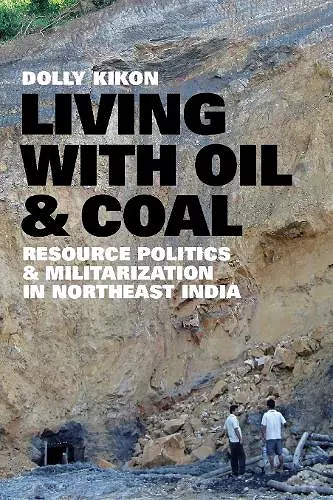Living with Oil and Coal
Resource Politics and Militarization in Northeast India
Dolly Kikon author K Sivaramakrishnan editor
Format:Hardback
Publisher:University of Washington Press
Published:15th Apr '19
Currently unavailable, and unfortunately no date known when it will be back
This hardback is available in another edition too:
- Paperback£27.99(9780295743950)

The nineteenth-century discovery of oil in the eastern Himalayan foothills, together with the establishment of tea plantations and other extractive industries, continues to have a profound impact on life in the region. In the Indian states of Assam and Nagaland, everyday militarization, violence, and the scramble for natural resources regulate the lives of Naga, Ahom, and Adivasi people, as well as migrants from elsewhere in the region, as they struggle to find peace and work.
Anthropologist Dolly Kikon uses in-depth ethnographic accounts to address the complexity of Northeast India, a region between Southeast Asia and China where boundaries and borders are made, disputed, and maintained. Bringing a fresh and exciting direction to borderland studies, she explores the social bonds established through practices of resource extraction and the tensions these relations generate, focusing on peoples’ love for the landscape and for the state, as well as for family, friends, and neighbors. Living with Oil and Coal illuminates questions of citizenship, social justice, and environmental politics that are shared by communities worldwide.
"In Living with Oil and Coal: Resource Politics and Militarization in Northeast India, anthropologist Dolly Kikon offers a rich account of life in the midst of a landscape defined by multiple overlapping extractive industries and plantation economies, and of the social relations through which a resource frontier comes into being."
* New Books in Anthropology podcast *"This is a versatile book that would be accessible for undergraduate audiences, yet contains complexity that would be of great interest for graduate audiences and scholars as well."
* Electronic Green Journal *"Kikon’s ethnography is rich, diverse, and makes an engaging read."
* Contributions to Indian Sociology *"The strength of Kikon’s work is...in the creativity and skill of its synthesis of existing theoretical work, applied to a new context and matched with local knowledge."
* Anthropologica *"[A] beautiful and gripping account of the intimate layers of life, vio-lence and sovereignty pattered throughout the militarised carbon landscape of the foothills of Assam and Nagaland in North East India."
* Postcolonial Studies *"[E]vocatively captures the intricacies and intimacies of daily life on this militarized resource frontier, drawing from stories, oral histories, and local myths, in spaces ranging from coal mines to oil rigs, rice fields to weekly markets and military checkpoints. Throughout, the book remains focused on the fragile and contested intimacies forged through trade, labor sharing, and love affairs across boundaries that are at once social, political, and ecological."
* PoLAR: Political & Legal Anthropology Review *"[A] fantastic read, a book that speaks to scholars as well as general public. Kikon combines grounded ethnography with theoretical elabortation, setting a new standard of excellence for the anthropology of the North East."
* Economic and Political Weekly *"Kikon has crafted the book skilfully with her narrative writing style...This book is an essential reading for those who want to understand the complex state-society dynamics in Northeast India."
* Cultural Geographies *"Dolly Kikon’s book, undoubtedly a fascinating work of ethnography, compels us to problematize seemingly unitary categories of hills and other land and waterscapes and also to think of the impact of extractive regimes not only on the environment but also on how environment then comes to exist for the human societies who experience them."
* Seminar *"Interdisciplinary scholarship on the environment has much to gain from Kikon’s book... The power of Kikon’s ethnography lies in its subtle, and unromanticized, insistence onthe creativity and fortitude of those communities living amidst such extractive debris. Kikon’s careful mapping of friendships, enmities, grieving, laughing, dying, working, loving, healing, teaching, struggling, and building helps us to see all of the fragile things that hold life together, and what we will still have to tend to once the oil is gone."
* H-Net *"[S]uperb...what is truly the exceptional strength of the book [is] a richly textured ethnography of how individuals and communities make their lives in the shadows of a region transformed by extraction."
* H-NISBN: 9780295745039
Dimensions: unknown
Weight: 408g
204 pages